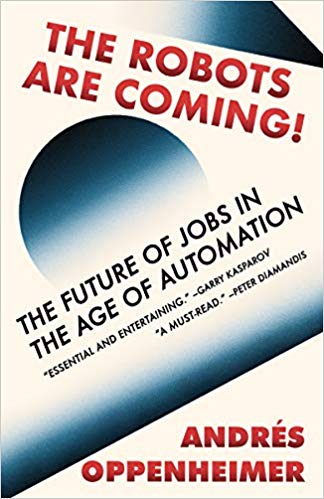You have /5 articles left.
Sign up for a free account or log in.
 The Robots Are Coming!: The Future of Jobs in the Age of Automation by Andres Oppenheimer
The Robots Are Coming!: The Future of Jobs in the Age of Automation by Andres Oppenheimer
Published in April of 2019.
Will robots take all the jobs?
What should colleges and universities do to prepare our graduates for the automation of cognitive work?
How should higher education change in response to the new technologies, such as artificial intelligence and ubiquitous connectivity?
The Robots Are Coming joins a growing list of books that attempt to answer these questions.
From a purely higher ed perspective, the best of the bunch is Joseph Aoun’s 2017 Robot-Proof: Higher Education in the Age of Artificial Intelligence.
The must-read book on the future of technology and employment is Frey’s recent The Technology Trap: Capital, Labor, and Power in the Age of Automation.
Other books that cover similar ground to The Robots Are Coming include:
- The Fourth Age: Smart Robots, Conscious Computers, and the Future of Humanity by Byron Reese
- Race Against The Machine: How the Digital Revolution is Accelerating Innovation, Driving Productivity, and Irreversibly Transforming Employment and the Economy by Erik Brynjolfsson and Andrew McAfee
- Human + Machine: Reimagining Work in the Age of AI by Paul R. Daugherty and H. James Wilson,
- Humans Need Not Apply: A Guide to Wealth and Work in the Age of Artificial Intelligence by Jerry Kaplan.
The best written, but most pessimistic, book on the impact of technology and jobs is Martin Ford’s 2015 Rise of the Robots. This is also a book that seems to have had an outsize influence on the thinking of many in academia.
The Robots Are Coming approaches the question of technological unemployment by going industry by industry. Oppenheimer, a TV journalist, and author divides each chapter into an examination of the impact of new technologies on specific professions. There are chapters on journalism, service workers, bankers, lawyers, doctors, factory workers, and entertainers.
Oppenheimer’s overall conclusion is that in the short-run, many jobs will be lost and that many of the people currently occupying these roles will lose out due to automation. In the long-run, however, Oppenheimer concludes that the new technologies will end up benefiting most people - as automation will drive growing productivity and thus greater societal wealth.
Of most interest to our IHE community will be the chapter on education. Here the focus is not only higher ed, but Oppenheimer does have some things to say about our industry.
Here, I’d say that he gets some things mostly right - and some other things mostly wrong.
Oppenheimer makes a credible argument that universities will evolve from degree-granting institutions to ones that offer lifetime education and credentialing. How we will find an economic model to make this shift - beyond expanding our executive education offerings - is a challenge that the book does not explore.
Where The Robots Are Coming misses the higher ed mark is in its discussion of online education. Like almost every other single person from outside of higher ed who writes about higher ed, Oppenheimer confounds MOOCs with traditional online learning.
The real story of the future of online education that we should be telling is that we will be dropping the “online.” Just as we no longer say “digital photography,” online education will only be "education." The norm will be to mix and match modalities of residential and online education.
Reading The Robots Are Coming will hopefully inspire someone - maybe one of you - to write about the future of higher ed employment. It would be an interesting exercise to figure out how technology will shape the higher ed labor force in the 21st century.
Will technology do to academia what it is doing to the entertainment and sports industries, driving the superstar economy where a very few rockstars and all-stars take most of the rewards?
Will technology drive higher levels of wealth and status concentration across postsecondary institutions, and if so, what will the impact be on higher ed jobs?
Or is there an alternative future, where technology enables a growth of the higher education pie? Will technology drive down the cost of education, therefore allowing more people (especially working adults) to attain postsecondary credentials? Do more students studying online create more or fewer opportunities for educators?
The challenge of a book like The Robots Are Coming is that this type of book does not lend itself to in-depth analysis. The book’s broad look at the impact of automation on many industries is one of the reasons that The Robots Are Coming is an enjoyable read.
As with the education chapter, however, one finishes the book wishing for a deeper dive and a more nuanced and complex analysis.
What are your favorite books about the future of jobs, and the race between education and technology?
What are you reading?








